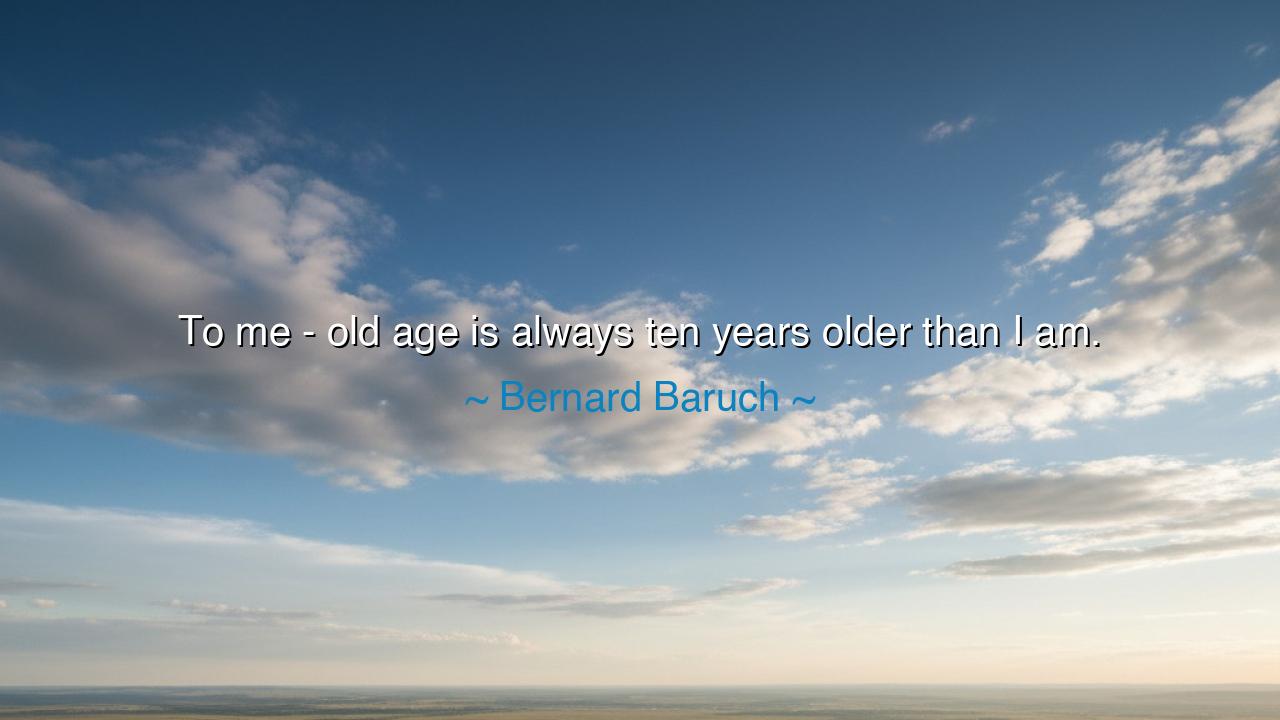
To me - old age is always ten years older than I am.






"To me - old age is always ten years older than I am." These words, spoken by the esteemed Bernard Baruch, speak not just to the passage of time, but to the perception of age itself—a perception shaped not by the number of years we live, but by our mind and spirit. Old age, as Baruch so succinctly puts it, is not a fixed point on the horizon, nor is it a destination we all must inevitably reach. It is a state of mind, an illusion that we often impose upon ourselves. Old age is not something that happens at a specific age; rather, it is how we feel, how we view the years that pass, and how we continue to engage with the world around us.
In ancient times, those who lived long lives understood the truth that age is not merely measured by the passing of time but by the depth and richness of experience. Consider the Greeks, who placed great value on the wisdom of the elderly, viewing them as the bearers of knowledge, yet also understanding that the spirit of youth—the curiosity, the passion, and the drive to seek understanding—was a quality that could be maintained throughout one's life. The philosopher Socrates, in his later years, was revered not for his age, but for the sharpness of his mind, the vigor of his inquiry, and the energy he brought to every conversation. Old age, in this light, is not something to be feared or begrudged, but something to be embraced with an open heart, unburdened by the expectation of decline.
Yet, Baruch’s reflection challenges the conventional wisdom that old age arrives at a specific age or time. He suggests that age is a construct, a perception shaped by one’s own thoughts, feelings, and actions. To some, old age might feel distant, something for another generation. To others, it may arrive with alarming speed, lurking just ahead, an inevitable force to be reckoned with. Baruch reveals that the way we view old age shapes its arrival, and that the spirit we cultivate through the years can either bring us closer to a life of vibrancy, or pull us toward a sense of limitation and stagnation. The mind can make old age seem ten years older than it truly is, just as it can delay it indefinitely by continuing to seek new knowledge, new challenges, and new growth.
Consider the great Leonardo da Vinci, whose life was marked not only by his astonishing achievements in youth, but by his youthful spirit well into his later years. Da Vinci’s mind was forever young, constantly searching for new answers, creating new inventions, and pushing the boundaries of his own understanding. Though he lived to be in his late 60s, he was always driven by a sense of curiosity that did not grow old. In his paintings, his studies, and his mechanical designs, Leonardo embodied the idea that age is not an inevitable descent into limitation, but a passage that can bring deeper insight, provided the mind remains engaged and curious. His old age was no older than his youth, for his passion and drive never ceased.
In contrast, consider the fate of those who, as they age, allow themselves to succumb to the belief that old age brings inevitable decline. The poet John Keats, though he died young, expressed in his writings a deep understanding that youth and vigor are not permanent, and that aging is an inevitable part of the human experience. But Keats did not bemoan the passing of time in the way many might expect. Rather, he wrote with a sense of urgency and beauty, embracing each moment as precious. His youthful spirit remained intact even as his physical life waned. Keats exemplified the understanding that age is a state of mind, one that is best met with acceptance, humility, and, above all, a continued passion for living.
Now, O children, let us take this lesson to heart. Old age is not the enemy, nor is it a burden to be dreaded. Rather, it is a reflection of how we approach life. If we choose to view age as a natural part of our journey, one that enriches us, teaches us, and allows us to grow in new ways, then we will continue to find purpose and joy in every season of life. To be young at heart is to recognize that age does not define us—it is our spirit, our mind, and our actions that determine our true age.
Embrace the years ahead, O children, not with fear or apprehension, but with curiosity, with passion, and with a heart that remains open to the infinite possibilities of each passing day. As Baruch wisely said, old age will be no older than you choose it to be, for it is in your mind, in your will to continue learning, growing, and engaging with life that your true youth resides. Let your age be a celebration of the wisdom, the experience, and the untamed spirit you carry within. Live with this truth: you are as young as you think you are, and old age is but a reflection of the life you choose to lead.






AAdministratorAdministrator
Welcome, honored guests. Please leave a comment, we will respond soon